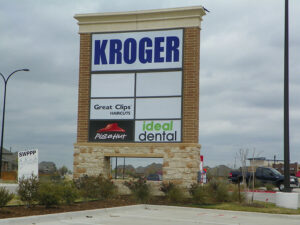 Signage is arguably one of the most important marketing components for a business, big or small.
Signage is arguably one of the most important marketing components for a business, big or small.
Signage is also relevant regardless of whether there is a physical building attached to a business or not. Many service-oriented businesses use signage to attract and guide customers without having a location. For example, a lawn care company or a traveling pest control service has no need for a physical building, as they typically operate out of a home office and drive to and from a client’s home directly. These businesses rely on standalone signs throughout a city or neighborhood and components like auto decal signage to attract customers in addition to a strong online presence.
There are many sign styles and designs, ranging from large standalone monument and building facade signs to window decals and even A-frame sidewalk boards.
Deciding on the right signage for your business is an important decision and should go hand-in-hand with your larger marketing strategy. To that end, there are four critical pieces of information that should be on a business sign, although not all of it should necessarily be on every sign:
- Business Name
- Brand/Logo
- Contact Information
- Physical Address
Business Name
The name of your business is your business’s identifier, so it should hold a strong presence on any signage. A name is what makes a business distinct and authentic. It represents the goods, products, and services provided. It also serves as a directional marker so people can actually find your place of business to visit, shop, or show up for their appointment.
On a sign, the business name should pop and stand out from other information. It’s typically multiple font sizes larger than other parts of the sign and is sometimes even lit up or designed to pop out of a sign, creating depth.
Visibility is the name of the game so to say.
Logo
Your business name is a piece of your overall brand, but including a specific logo on a sign gives people a simple and recognizable image to attach to your business. Logos improve your business’s recognition and can easily be used across many marketing platforms. The beautiful thing about logos is that they can be sized up or sized down, so they can be included on anything from the largest billboard to the smallest stamp and any marketing medium or material in between.
Contact Information
Throughout the day, customers might want to get certain information about your business, ask questions, or look up directions. Having a level of simple contact information on your exterior signs helps people get a hold of your business and learn a little more about your business. It’s all about transparency, simplicity, and convenience, so something like a phone number or website goes a long way.
In addition, your business might not be physically open 24 hours a day, 7 days a week. Through your contact information on your signage, customers can still get information about your business when you are closed.
Physical Address
Part of your customer’s experience is actually getting to your physical business building or location, so having a physical address on your signage can also be very helpful. If your business is located in a larger complex or on a specific floor in a highrise, your signage needs to help customers navigate a more complicated directional aspect.
It is also the case that many businesses advertise in an area of town where their business is not located. Having the physical address along with the business information puts everything in one place for the customer.
Fun Fact: Wayfinding Signs
In addition to signage that is critical for marketing and attracting customers to a business, there is another type of signage that is relevant to a business with a physical location: wayfinding signs.
Wayfinding signs include four different types:
- Identification. These are signs that point out a specific location or landmark. For example, an identification sign on the door for the bathroom vs. the door for the kitchen.
- Directional. These are signs that help people navigate to a specific destination or provide a series of directions. For example, in an airport parking garage, directional signage helps passengers navigate their way to the airline check-in counters and bag drop-off.
- Informational. These are signs that give a level of useful verbiage about a situation. For example, an informational display about the accommodations and special services in a reception area of a hotel.
- Regulatory. These are signs that are driven by building, government, safety, or industry rules, laws, or guidelines and must be posted throughout a space. For example, no smoking signs or ADA-compliant signage under the Americans With Disabilities Act.
A truly well-rounded business location should combine all different sign types, styles, and purposes for the ultimate in-person experience. Getting customers to the business is step one. Ensuring they know where to go, what to do, and how to get the most out of their time at your business is step two.
In Business Since 1989
If you are a business owner in the Dallas–Fort Worth Metroplex and want to draw people and attention to your business, Legacy Signs of Texas has you covered!
We design and fabricate all types of signs and also specialize in installation and repairs. You can trust that your sign will be of the highest quality because we know the impact signage has on your business.
Give us a call to learn more about our services or request a free estimate for your next sign via our convenient online form.
